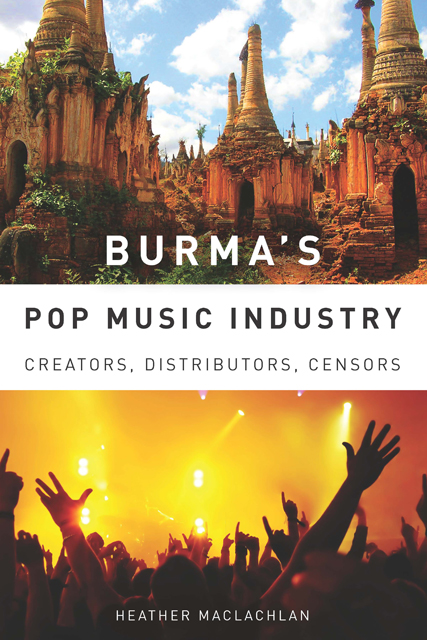Book contents
- Frontmatter
- Dedication
- Contents
- List of Illustrations
- Acknowledgments
- Introduction
- 1 The Creators of Burmese Pop Music
- 2 The Sound of Burmese Pop Songs
- 3 Learning Music in Burma Today
- 4 Six Facets of the Burmese Pop Music Industry
- 5 Musicians and the Censors: The Negotiation of Power
- Conclusion: The Significance of the Burmese Perspective
- Notes
- Bibliography
- Index
3 - Learning Music in Burma Today
Published online by Cambridge University Press: 11 February 2023
- Frontmatter
- Dedication
- Contents
- List of Illustrations
- Acknowledgments
- Introduction
- 1 The Creators of Burmese Pop Music
- 2 The Sound of Burmese Pop Songs
- 3 Learning Music in Burma Today
- 4 Six Facets of the Burmese Pop Music Industry
- 5 Musicians and the Censors: The Negotiation of Power
- Conclusion: The Significance of the Burmese Perspective
- Notes
- Bibliography
- Index
Summary
Ethnomusicologists prize participant-observation research. We aim to learn about musical cultures by participating in them. As I researched Burma’s professional music scene for this book, I did not hold out much hope that I could actually participate in music making; after all, people earned their livelihoods at the studio sessions and performances I observed, and were unlikely to relinquish part of the process to a foreign researcher. Imagine my delight, then, when one of my favorite composers, Ko Htwe, asked me to record the keyboard part for a song on his upcoming album.
On the appointed day, I presented myself at the small recording studio owned by Soe Htun—only to discover that Ko Htwe was working on his family’s goat farm that day. Luckily, Soe Htun is a friend of Ko Htwe, and was able to contact him to find out exactly which song I was supposed to record. Ko Htwe directed his recording engineer, Aye Nai, to play the demo for me. I dutifully sat down to write out the chord progression and melody in order to be able to improvise a piano accompaniment. When Soe Htun saw that I was working through it much more slowly than expected, he came in to help me.
At this point, the differences in our respective backgrounds became apparent. As a Western-trained classical musician with perfect pitch, I can write out a series of chords, but since I have not spent much time doing this, I find it challenging. I write the chords as I hear them—in this case, in E major, since the demo track was recorded in that key. Soe Htun, on the other hand, listens to and writes complex chord progressions on a daily basis, but he always writes them in C, following the standard practice in his industry. After about ten minutes, during which we tried to merge our understandings of the music, Aye Nai mentioned that Ko Htwe had already created notation. I seized on this, wondering why no one had said anything earlier.
After playing through the part repeatedly, using Ko Htwe’s notation, I told Aye Nai that I was ready to record. He misunderstood me, thinking that I merely wanted to rerecord the solo section. It turned out that he had been recording every “take,” unaware that I was only practicing.
- Type
- Chapter
- Information
- Burma's Pop Music IndustryCreators, Distributors, Censors, pp. 73 - 108Publisher: Boydell & BrewerPrint publication year: 2011



